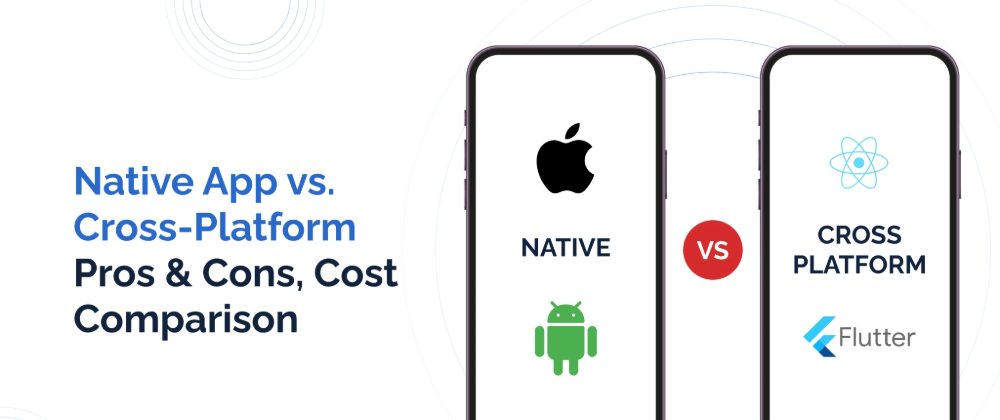Mobile apps are no longer optional—they're essential tools for businesses to engage users, streamline operations, and drive growth. But before jumping into development, there’s one critical decision every business must make: Should you build a native app or go with a cross-platform approach?
This decision isn’t just about technology; it can define the future success of your mobile app. Each strategy comes with its own strengths and limitations. Understanding the differences can help you align your development approach with your business goals, timeline, and budget.
In this blog, we’ll break down native vs cross-platform app development and help you determine which path is right for your next mobile project.
What is Native App Development?
Native app development means building apps specifically for a particular platform—like iOS (Swift or Objective-C) or Android (Kotlin or Java). These apps are tailored to the platform’s standards and are optimized to utilize device hardware and OS features.
Key Advantages of Native Apps:
High Performance: Native apps are faster and smoother because they’re optimized for one platform.
Better UI/UX: Offers a more intuitive and responsive user experience using platform-specific design elements.
More Secure: Better control over data protection and built-in security protocols.
Access to Device Features: Camera, GPS, microphone, gestures, push notifications—native apps access everything seamlessly.
Limitations:
Higher Development Cost: You need separate codebases for iOS and Android, which means more development time and cost.
Maintenance Overhead: Bug fixes, updates, and new features need to be implemented separately on each platform.
What is cross-platform app development?
Cross-platform development allows you to build a single app codebase that works across multiple platforms—primarily iOS and Android. Popular frameworks include Flutter, React Native, Xamarin, and Ionic.
Key Advantages of Cross-Platform Apps:
Cost-Efficient: Develop once, deploy everywhere—reducing time and cost significantly.
Faster Time to Market: Shared codebase speeds up development and updates.
Easy Maintenance: Bug fixes and updates are implemented once for both platforms.
Wider Audience Reach: One app, two major platforms—greater exposure in less time.
Limitations:
Slightly Compromised Performance: Not as fast or fluid as native apps, especially for complex interactions.
UI Limitations: Platform-specific features or animations may not work identically across devices.
Limited Access to Some Native APIs: Some device features may require native coding or third-party plugin support.
Native vs Cross-Platform: Which One Should You Choose?
Let’s break it down by business needs:
- Choose Native Development If: Your app demands high performance and advanced animations (like gaming, AR/VR, or financial apps).
You want to deliver a premium user experience that’s aligned with platform-specific UI standards.
You have the budget and time to develop and maintain two separate versions.
Your app relies heavily on device hardware like Bluetooth, GPS, camera, etc.
- Choose Cross-Platform Development If: You need to launch your app quickly on both Android and iOS.
Your app is relatively simple and doesn’t need complex interactions or platform-specific functionalities.
You have a limited budget but still want to reach a broad audience.
You want to validate your idea with a minimum viable product before scaling.
Real-World Example Scenarios
A fitness startup with a tight budget and a need to launch quickly might go with Flutter or React Native for rapid deployment and testing.
An enterprise banking app with strict security and performance needs will benefit more from native development.
A retail eCommerce brand looking to test a new shopping feature across iOS and Android users can use cross-platform tools to save time.
Our Expert Recommendation
At WeeTech Solution, we understand that there’s no one-size-fits-all approach. Our development team first dives deep into your business goals, target audience, and feature requirements. Then, we help you choose the right path—native, cross-platform, or even a hybrid model—to ensure that your mobile app aligns perfectly with your success roadmap.
We’re not just coders—we’re your tech partners in growth. Whether you're launching a startup app or scaling enterprise software, we deliver custom mobile solutions that perform.
Conclusion
The decision between native and cross-platform app development is not just a technical one—it’s a strategic choice that affects performance, budget, timelines, and user satisfaction. If you’re aiming for exceptional user experience and long-term scalability, native is worth the investment. If speed and cost-efficiency matter more in your early stages, cross-platform can help you go to market faster.
Still unsure what’s right for your app?
Let’s talk! Our mobile app experts are ready to guide you toward the smartest decision for your project’s success.



Top comments (0)